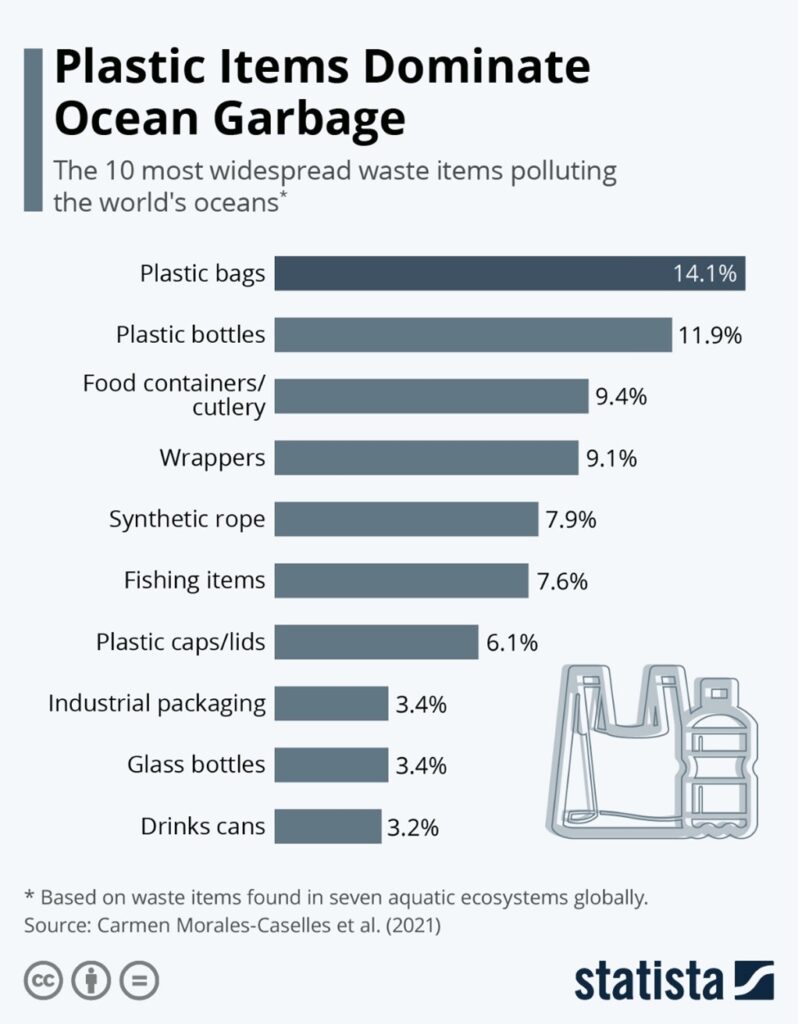Single-use plastics have many negative impacts on the environment and human health. Plastic waste can degrade ecosystems and harm wildlife. Plastic pollution puts marine species at higher risk of ingesting plastic, suffocating, or becoming entangled. Plastic is derived from fossil fuels and can contribute to climate change. The Organisation for Economic Cooperation and Development (OECD) estimated that in 2019, plastic products were responsible for 3.4% of global greenhouse gas (GHG) emissions throughout their life cycles. Ninety percent of emissions are generated from the production and conversion of fossil fuels into new plastic products. OECD also reports that GHG emissions associated with the life cycle of plastic products are expected to double by 2060, unless human behavior changes. In addition, the World Economic Forum predicts that without intervention, the global plastics industry will account for 20% of total oil consumption, and up to 15% of global carbon emissions by 2050.

Single-Use Plastics Directive
The European Union (EU) has taken a significant step toward reducing plastic waste by banning single-use plastics by 2030. The Single-Use Plastics Directive is part of a broader plan to make packaging more sustainable across the EU. The new regulation targets various types of single-use plastic packaging, including those used for packaging of fresh fruit and vegetables, food containers including individual servings of sauces and condiments, and single-use plastic toiletries found in hotels. Single-use plastic products are more likely to end up in the ocean than reusable options.
Single-use plastics are disposable items designed for one-time use that are designed for convenience. Annual plastic production exceeds 300 million tons globally, with half being single-use items. Common examples include beverage bottles, shopping bags, product packaging, straws, disposable coffee cups, and food storage bags. The main components of plastic are fossil fuels like natural gas and crude oil. Unlike organic materials, plastic does not decompose naturally. Instead, it fragments into tiny particles called microplastics. When animals ingest too many microplastics, it can lead to organ damage or intestinal blockages. For humans exposed to plastic-associated chemicals, they may experience hormonal imbalances, reproductive issues, and in some cases, cancer.
The objective of the EU rules on single-use plastic products is to prevent and reduce the impact of certain plastic products on the environment. The EU also aims to promote the transition to a circular economy with innovative and sustainable business models, products and materials. The directive has been making significant strides in reducing plastic pollution across Europe including:
- Reduced consumption: The ban on certain single-use products has led to a decrease in their consumption
- Increased use of reusable alternatives: Consumers are opting for reusable options
- Innovation in sustainable materials: Companies are investing in research and development (R&D) to find sustainable alternatives to single-use plastics
- Economic impact: New opportunities for companies producing and selling sustainable alternatives
The directive is a significant step toward addressing the global plastic pollution crisis, and promoting a more sustainable future.
Why It Matters to US Companies
While the EU Single-Use Plastics Directive primarily targets European companies, it has significant implications for American companies. If a company exports products to the EU or has suppliers or customers in the region, they must comply with the directive’s requirements to avoid trade barriers, fines, and damage to their brand reputation. By proactively addressing the directive’s requirements, US companies can demonstrate their commitment to environmental sustainability, mitigate risks associated with single-use plastics, and develop innovative, sustainable alternatives. The directive can also incentivize the adoption of a circular economy approach. This will reduce waste and improve resource efficiency.
Single-Use Plastics in the US
While the US does not have a single-use plastics directive at the federal level, there has been a growing movement toward reducing single-use plastic consumption. Many states and companies are enacting their own regulations and bans. US initiatives to reduce single-use plastic include:
- State bans: California was one of the first states to implement a statewide ban on plastic bags. As of January 2024, 12 states have implemented statewide bans on single-use plastic bags, including California, Colorado, Connecticut, Delaware, Hawaii, Maine, New Jersey, New York, Oregon, Rhode Island, Vermont, and Washington. Colorado and Rhode Island’s bans took effect at the start of 2024.
- Corporate initiatives: Numerous corporations are committed to reducing their use of single-use plastics and exploring sustainable alternatives. Notable examples include:
The growing awareness of the environmental impact of plastic waste has led to increased pressure not only on corporations to adopt more sustainable practices, but also government agencies. President Biden’s Executive Order 14057 calls for federal agencies to take actions to reduce and phase out procurement of single-use plastic products to the maximum extent practicable.
In conclusion, the EU’s Single-Use Plastics Directive represents a significant legislative effort, setting a precedent that could lead to similar measures worldwide, including in the US. As companies and governments alike are increasingly held accountable for their environmental impact, there is a clear momentum toward innovation in sustainable materials and a shift toward a circular economy.
The ongoing efforts in the US, with various states implementing bans and corporations committing to reducing plastic use, highlight the growing recognition of the need for change. As the movement against single-use plastics gains traction, it presents both challenges and opportunities for companies. Those that proactively embrace sustainable practices not only contribute to a healthier planet, but also position themselves as leaders in a rapidly evolving market. The collective action of governments, businesses, and consumers will be crucial in shaping a more sustainable future, reducing reliance on fossil fuels, and mitigating the global plastic pollution crisis.


